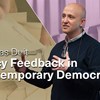adequate
The indispensability of sufficientarianism
Critical Review of International Social and Political Philosophy, published online. doi.org/10.1080/13698230.2018.1479817 Abstract In this paper, I argue that sufficientarian principles are indispensabl
Ethical Challenges in Using DALYs to Inform Health Interventions: Some Lessons from Population Ethics
Institute for Futures Studies. Working paper 2025:2 From the introduction The Global Burden of Disease Study (GBDS) is an international and interdisciplinary effort to quantify health losses from a wide
The effect of number of siblings on adult mortality: Evidence from Swedish registers for cohorts born between 1938 and 1972
Population Studies, Volume 71, Issue 1, doi.org/10.1080/00324728.2016.1260755 Abstract Demographic research has paid much attention to the impact of childhood conditions on adult mortality. We focus on o
Completed: Sequences of Democratization
Why do some democratic transitions succeed and others do not? We attempt to identify which sequences lead to full and stable democracy and which sequences do not.
The transparency imperative: The need for model documentation for engaging with public policy following the EU AI Act
Conference paper, Annual Modeling and Simulation Conference (ANNSIM'25) Abstract The application of Agent-Based Modeling and Simulation (ABMS) has few established guidelines and oftensuffers from insuffdifferent types of model documentation in light of the European Union’s AI Act (AI Act). Our analysisreveals that best practices are often implemented together but ultimately reinforce the pre-existing viewthat ABMS frequently lacks adequate model documentation. This deficiency hinders evaluability, makingit difficult to conduct quality assurance prior to application and meaningful evaluation post application.We propose a framework that highlights the importance of different types of model documentation and theattributes they enable, which are valuable to both modelers and policy actors, albeit for different reasons.The AI Act provides a valuable opportunity to improve model documentation. By proactively developingand establishing guidelines, we can stay ahead of emerging legal requirements.
Completed: Valuing future lives
How should we value future lives when making decisions? This question is directly relevant to for example prioritisation in health care, population control, climate change, and existential risk (the survival of animal species and humanity).
Developing ethical competence in healthcare management
Journal of Workplace Learning. 28(1), 17–32, doi.org/10.1108/JWL-04-2015-0033. Abstract PurposeThe purpose of this paper was to explore what kind of ethical competence healthcare managers need in handli
Lukas Meyer: Legitimate Expectations and Compensation in Changing Circumstances
Venue: Institute for Futures Studies, Holländargatan 13 in Stockholm Research seminar with Lukas Meyer, professor of philosophy at the University of Graz. Abstract: This paper discusses how legitimate exp
Andreas Duit: How Policy Creates Politics: Policy Feedback in Contemporary Democracies
Venue: Institute for Futures Studies, Holländargatan 13 in Stockholm, or online. Research seminar with Andreas Duit, Professor at the Department of Political Science, Stockholm University. Andreas Duit

Andreas Duit: Policy Feedback in Contemporary Democracies
How Policy Creates Politics: Policy Feedback in Contemporary Democracies Research seminar with Andreas Duit, Professor at the Department of Political Science, Stockholm University. Andreas Duit works








